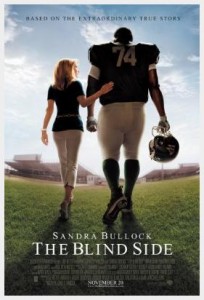I’ve not seen the movie The Blind Side yet, but I read two articles this morning that have inspired me even  more to see the movie. The first is an article on Sandra Bullock who says that she has finally met Christian people who “walk the walk,” and that as a result she has some faith in Christians now:
more to see the movie. The first is an article on Sandra Bullock who says that she has finally met Christian people who “walk the walk,” and that as a result she has some faith in Christians now:
Bullock says thanks to the Tuohys, who attend Grace Evangelical Church in Memphis, she now has “faith in those who say they represent a faith.” Getting to know Leigh Anne Tuohy, says the actress, showed her that religious faith can be authentic. “She was so open and honest and forthright,” Bullock shares, “and I said, wow, I finally met someone who practices but doesn’t preach.”
It’s sad that her opinion of Christians has been so skewed, but it is encouraging to know that in our postmodern world, the greatest impact we can make on non-believers comes first through experience. Living your life as Christ would have you live can and will open doors for the gospel.
Secondly, I read a commentary on the movie that exposes some of what can be accomplished by people committed to the gospel and some flaws with government controlled education and welfare. Star Parker is spot on when she points out that people (and especially teens) will be changed, not by government programs, but by other people who invest in them.
Our wake-up call should be that the factors that saved and transformed Michael Oher’s life stand in stark contrast to the government solutions we hear from Washington about dealing with our problems relating to poverty and education.
Oher’s story is about private individuals, about personal choices and responsibility, and about Christians.
The takeaway for us? Missions and care for other cannot be delegated to the government (or even to denominational bodies for that matter), it is always a personal issue that involves real people helping other real people in the name of Christ.

